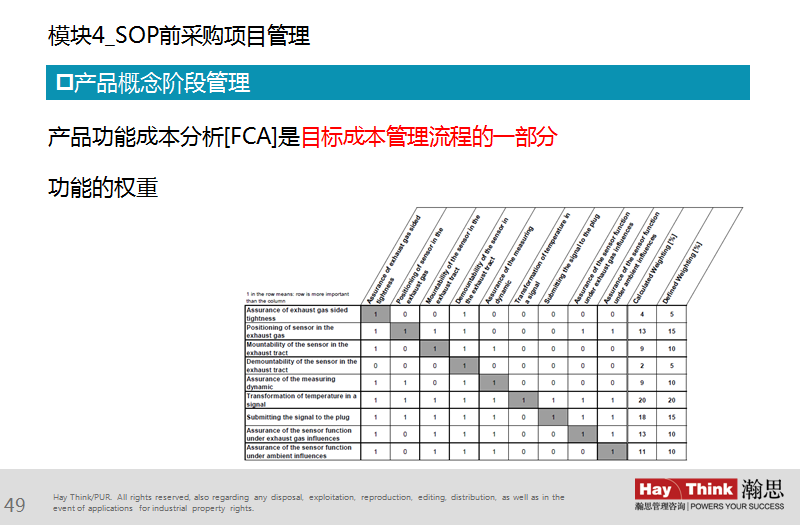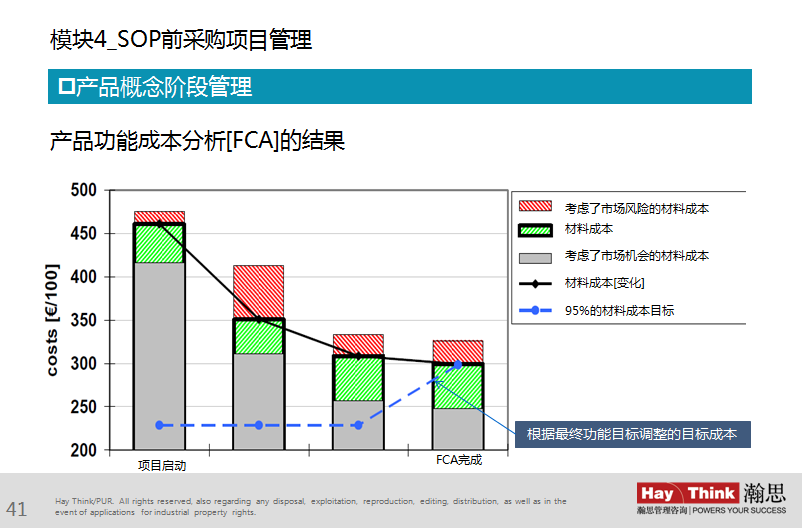Continental AG [Continental AG], founded in 1871, is a transnational enterprise group with a century-old history.
On July 19, 2018, the Fortune Global 500 list was released, and Continental Germany ranked 206th.
Like the German Robert Bosch Group Robert Bosch, it belongs to the top international auto parts suppliers.
These multinational groups have similar corporate cultures and corporate values in the enterprise.
Today we talk about the core issues of project procurement management involved in the field of procurement management by Continental AG:
Target Cost Management and Functional Cost Analysis FCA
The calculation of target cost is very important for the development of any new project or platform product of an enterprise. The accuracy of target cost calculation and the true cost calculation at the project concept stage play a decisive role in the normal progress of a project.
If all cost reduction methods such as: VE value engineering, different procurement strategies, supplier development, etc. cannot meet the target cost requirements in the project concept phase, this project will not create value for the enterprise, so the project will inevitably Terminated …
Target cost management consists of three sub-processes:
Process 1. Target cost definition
Process 2. Target cost realization and monitoring
Process 3. Measurement and Evaluation of Achieving Target Costs
The target cost must be defined at the beginning of the project, and the target cost will change accordingly when market conditions and customer requirements change.
Processes 2 and 3 are repeated until the target cost is achieved, or the project is stopped if the target cost cannot be achieved.
Process 1. Target cost definition
Project target costs can be easily defined, at least based on competitors' prices / costs, similar product costs, and previous-generation product costs.
Variable costs include:
Production experience, production capacity, cost reduction measures for similar products.
The target cost must be broken down into components and individual parts. The functional cost analysis [FCA] tool of the product is particularly suitable for this purpose. As the basis of the FCA, the initial cost estimate for each part must be purchased by the purchasing project manager and manufacturing representative [ In-house manufactured parts].
Reasonable cost analysis and early cost information are based on:
Supplier Quotation [Structured Quotation]
Team experience
Professional costing internally based on detailed cost data
Target price provided by the customer
Product strategy development based on market estimated prices
Target cost agreement
The purchasing project manager must define the initial cost target at the beginning of the project. The material cost market target is a formal target [functional cost analysis from licensing FCA].
If different procurement strategies, technical capabilities, and even sales profit reductions have been considered, the target cost cannot be achieved, and project development must be stopped immediately.
If it is a strategic continuation project, the relevant project leader must know.
A project target agreement can only be signed in a state where target costs can be achieved or a special permit is obtained.
Achieving target costs
In the product development process: focus on value engineering
In the product production realization stage: focus on achieving standardization
Target cost realization direction:
Value Engineering VE
Supplier Development [STEP]
Quality Control
Specific methods for achieving target costs:
Establish a structured cost structure and standards
Structured cost analysis and assessment
Cost-based design
APQP / FMEA / SPC / MSA / PPAP
Global procurement / localization
[Finding the most competitive suppliers and new technologies, new materials and new processes worldwide …]
Supplier Development / Lean Manufacturing
Other procurement strategies
…
Functional Cost Analysis FCA
Functional cost analysis refers to the decomposition of functional costs and parts costs among products.
Analyze the actual cost of each function in the original product. With the actual cost, we can compare the functional value with the functional value, and improve the functional part with low value.
Functional cost analysis is to solve the problem of "what is the actual cost of this function", which is different from traditional cost analysis. The traditional method uses the physical object of the product or component as the object to calculate, while the work cost analysis uses the function as the object to calculate the cost.
In a product, a part often has multiple functions, and a function is often realized by several parts. Therefore, when calculating the actual cost of the function, we must first analyze the role played by each part in the process of implementing the function according to the functional system diagram to find out the relationship between the part and the function. From the functional system diagram, it can be seen which functional areas a certain part plays a role in, and which parts are implemented by a certain functional area. The relationship is clear, and the corresponding cost can be calculated.



Process 2. Achievement and monitoring of target costs
Functional cost analysis FCA is affected by:
Estimates based on inaccurate cost data
Changes during product development
Market economy
Material change
Changes in material costs
…
Changes in any of the above factors will trigger changes in product costs [especially rising]. It is necessary to regularly compare the initial target costs and to follow market developments.
Target cost index ≤ 0.85 [target cost = 0.85 * initial estimated cost]

Process 3. Measurement of target cost achievement


